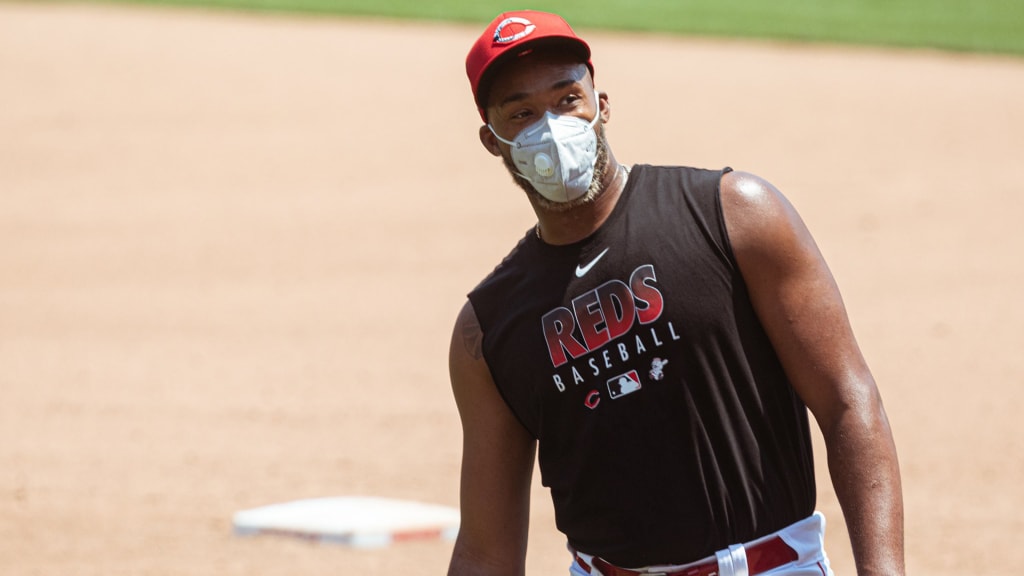
CINCINNATI -- Reds reliever Amir Garrett wasn’t sure he wanted to discuss it publicly. When a question was posed to him on Monday morning, Garrett paused for several moments before deciding to answer.
Did Garrett have any personal experiences with racism?
“It's very tough for me,” Garrett said. “But I think I feel comfortable sharing with you guys and … I feel like if I open up and share my experiences, I feel like it can help somebody else, so ...”
It was 2010 and Garrett was finished with his day at Leuzinger High School in Lawndale, Calif., and headed to basketball practice with a friend who was driving.
“[He’s] going the speed limit, he's just playing his music loud, trying to look cool and stuff like that. We're on our way to basketball practice. We got pulled over by police. They pulled up behind us. He says, 'Amir, just relax, keep your hands on the dashboard.' So the cops come up to the car and say, 'What are you guys doing?' Just right away, aggressive. I say, 'Nothing, we're going to basketball practice.' They tell me to get out of the car, they tell my friend to get out of the car.”
Then things got scarier for Garrett and his friend.
“They say, 'You guys have any drugs in the car?' We say, 'We don't have anything,'” Garrett said. “At this point, I'm like, 'We're going to basketball practice.' We're minding our own business. They throw me up against the car, they throw him up against the car. They start patting us down aggressively. I don't care what anybody says, but if you get handled like that and you're not doing anything, your reaction is to resist. I wasn't resisting too much. I was like, 'What did I do?' I knew I didn't do anything, so why am I getting treated like this? He slams me up against the car and he tells me, 'Give me a reason, because I will [mess] you up.'
“At that moment, it's like, ‘Dang,’ like ... I could be hurt, you know? I don't even know what I was feeling, man. He asks us again, 'Do you have any drugs in the car?'”
Garrett described the officers making a meticulous search of the car for drugs that were not found. Eventually satisfied, they let the two teenagers go on their way.
“They say, 'OK, you can go, but next time don't be playing your music around here so loud or we ain't going to be so nice next time.' My friend looks at me and the first thing he says is that, 'My parents are going to be so mad, look at my car.' His car was gutted, everything thrown out on the side of the road and they just get in their car and leave.”
It was a story that Garrett had previously shared with his teammates, privately.
Even while socially distanced and having team meetings over Zoom, the Reds wanted to have and encourage what can often be an uncomfortable conversation about racial issues, social justice and change. The first such discussion happened during a pre-workout meeting on Saturday, and because it’s such a complex issue, there will likely be more.
Since baseball was shut down for the COVID-19 pandemic, the subject of race moved to the forefront in response to the police killings of George Floyd, Breonna Taylor and Rayshard Brooks and the murder of Ahmaud Arbery. For their meeting, the Reds invited guest speaker and community leader Tru Pettigrew to talk to the club.
“He facilitated what turned out to be a really courageous conversation for our team,” Reds manager David Bell said. “I think we all took a lot away from that conversation. For us as a team, for us as an organization, we want to make sure we’re educating ourselves, that we’re having an open dialogue. That we’re truly listening. We’re asking questions. We’re listening. We’re respecting one another.
“As our speaker quoted, it’s a really important time that we seek first to understand, then to be understood. That kind of summed up the conversation the other day, and the one we want to have moving forward.”
Like most others, Bell was home watching the news of the violence against African Americans and the protests and rioting that resulted. The moment had him speaking to friends, former teammates and colleagues about the issue like never before.
“I have to say for the first time, I truly asked questions and understood experiences people I’ve been close to have had in their life. I never took the time to truly understand or try to understand,” Bell said. “It’s been a process. I think it’s just scratching the surface. It’s a step. I certainly have a long way to go.”
From his home in Toronto, Reds first baseman Joey Votto has had those conversations also. He received a text from Garrett on May 28, the day video emerged of a Minneapolis police officer choking Floyd to death with his knee. At first, Votto didn’t fully understand Garrett’s frustration and the issue at large.
In June, Votto wrote an op-ed for the Cincinnati Enquirer and vowed to do better at understanding the experiences of people of color. Votto hasn’t stopped listening and has also spoken to first-base coach Delino DeShields, who is African American.
“I’ve been, I don’t want to say willfully ignorant, but I think I’ve been avoiding the subject, as I think almost everyone has a tendency to do with things that don’t affect us,” Votto said. “They challenged me, and I started doing some research. I tried to understand the best I can wearing the skin color that I wear, or just listen. Maybe 'understand' is not the right word, because I would never understand it, but it’s crazy to me how clear this subject is.
“I’m not a real big right-or-wrong, good-or-evil type of person. I don’t really see the world in that way, but man, it just feels right and wrong. I felt obligated to say something and I feel like I’ve changed as a man.”
Garrett appreciated Votto’s willingness to have the conversations, even if he didn’t really hear what was being said initially.
“He’s definitely one of the smartest people I know,” Garrett said of Votto. “He came back a few days later, and he’s like, ‘Amir, I’m sorry. I’ve seen that and I’m sorry.’ If it doesn’t directly affect us, then you don’t really worry about it too much. I’m guilty of that. But for him to come back and tell me, and to say how he felt, and then come out with that article -- that’s not because somebody told him to. That was his own doing. That definitely showed a lot and meant a lot.”
The recent events have motivated Garrett to speak out and use his platform as a Major League player. He posted on Twitter last week that he would no longer stay silent. On June 19 -- Juneteenth -- he participated in a panel to discuss racial issues with his lone Black teammate, Phillip Ervin, plus DeShields, Jesse Winker and former Reds stars Eric Davis and Barry Larkin.
Back in 2016, when 49ers quarterback Colin Kaepernick spawned conversations about race by taking a knee instead of standing during the national anthem, Garrett was a Minor League player. In the years that followed, he admitted to being scared to speak openly about Kaepernick and the larger issue.
“Because in baseball, there are not a lot of African Americans who play the game,” Garrett said. “I was nowhere near Colin Kaepernick, so my little voice, I felt like could be pushed to the side. As a player and African American and the small percentage we have in MLB, I felt like I could be pushed out of the game. That was scary to me. That was really scary to me.
“Now I felt in my heart I was ready to handle the consequences, whatever may have come from this. I was going to speak up regardless. It was something that I was feeling to make a change, to be a better person, to help others be better people in this world. The time is now.”
As for Saturday’s meeting with Pettigrew and the reactions from Reds teammates, Garrett was incredibly grateful and called it “amazing.”
“It meant a lot to me,” Garrett said. “It showed me that as an organization, you know, I have a lot of support and we’re a close-knit family.”
